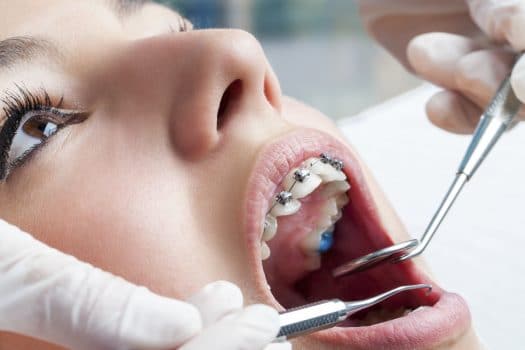It is a popular question that arises among new braces-wearers: If I am having regular orthodontic checkups, do I really still need to see the dentist? The answer is yes.
While you might think the attention professionals are paying to your teeth is already impressive, you should never skip your regular dental checkups. Your braces make you more prone to plaque and tartar accumulation, so your cleanings are actually more important now than ever. This is the only method that ensures nearly all harmful buildup is removed from your mouth.
Maybe you are wearing clear aligners for your adjustment. Sadly, it doesn’t get you off the dental hook. Cleanings are still necessary. The clear plastic mouthpiece helps to create a warm, moist environment where bacteria can grow.
What is the Role of My Dentist During Braces?
Your dentist is your primary oral health provider. This means the dentist is typically the first to diagnose any problems, while helping you maintain clean and healthy teeth. When problems arise, the dentist might treat them himself or refer you to a specialist who has received extensive training in that area. Perhaps it was your dentist that first recommended you wear braces.
Other functions the dentist might perform include cleanings, fillings, gum care, root canals, veneers, bridges and preventative education. Your dentist’s role in your care does not significantly change during braces.
How Often Should I See the Dentist?
Everyone should receive a dental cleaning at least once per year. Depending on the condition of your teeth and gums, as well as risk factors for tooth and gum disease, the dentist might ask you to visit up to four times per year. While you are in braces, many orthodontists will recommend that a hygienist cleans you teeth between two and four times per year, even if your mouth is in great shape. This is because your risk factor for developing cavities and other dental problems increases while you wear braces.
Do I Have to Brush and Floss as Regularly with More Frequent Dental Checkups?
Never confuse more frequent dental care as a substitute for your responsibilities at home. Getting your teeth professionally cleaned more does not mean it is OK to slack on your home-care instructions. Your orthodontist will provide detailed information on how to care for your teeth while in braces, including how to brush and floss effectively. You need to follow these instructions in addition to attending appointments with your general dentist. If you do not follow your prescribed oral hygiene regimen, several conditions could arise including:
- Gingivitis
- Bad Breath
- Tooth Pain/Sensitivity
- Tooth Discoloration
- Cavities
Tips for Making Your Dental Visit More Pleasant

Relax Before Your Visit
Whether it is meditation, yoga, music or aromatherapy, engage in some activity that relaxes you before you leave for your appointment. Getting into a relaxed mindset can significantly ease the anxiety you experience at the office.
Leave Early for Your Appointment
You don’t want the added stress of running late if you already are worried about your appointment. Make sure to leave a bit early so that you can take your time getting there.
Bring Comfort Items
For children especially, it can help to bring an item that they enjoy, such as a favorite stuffed animal or action figure. For older children and adults, bring along a favorite book or music.
Communicate with Your Dentist
Many times, dentists who have nervous or dissatisfied patients are not aware of it. You can ease some of your appointment anxiety by communicating honestly with your dentist about how you feel. Let your dentist know if you are feeling anxious or uncomfortable. When he tells you to stop him if you are feeling discomfort, he means it. If you grin and bear it through an uncomfortable procedure, the dentist has no way of knowing you were upset. And this can create a lot of anxiety going into your next appointment.
Dentists who are aware of a patient’s anxiety will usually take steps to help the patient feel more comfortable. That could include applying less pressure, administering a numbing agent or taking frequent breaks.
Stay Diligent with Your Braces Care
We’ve said it before, but it is of utmost importance—when you are wearing braces, regular brushing, flossing and other oral hygiene habits are an absolute must. Not only will it positively affect your orthodontic care, but you trips to the dentist will go a lot smoother.
At Orthodontic Associates, your healthy smile is our top priority. We monitor and assist with your dental care before, during and after braces. Contact us at one of our nine convenient locations around Baltimore to schedule a consultation. We look forward to making you smile.




Enna buenafe
Thank u so much it helps me a lot…